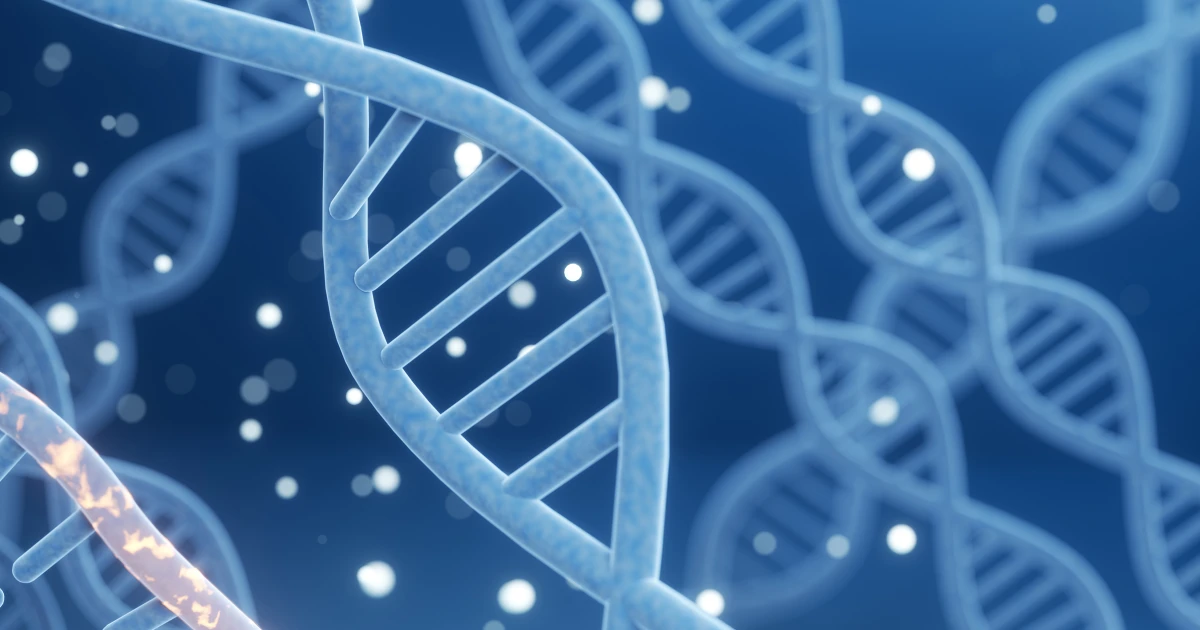
In 2023, Jill Martin took a test that changed her life. She underwent genetic testing for breast cancer and learned she had a BRCA2 mutation, which increases one’s risk of developing breast and other cancers, including ovarian cancer.
Prior to learning that she had the mutation, she underwent a mammogram and a sonogram, both of which showed normal results. Jill learned she had breast cancer after receiving her genetic testing results and undergoing a breast MRI in preparation for what she thought was a preventative double mastectomy.
“Had I taken it earlier, I wouldn’t have had to go through endless surgeries and chemotherapy and radiation,” Jill tells TODAY.com. “Genetic testing is power, not something to be scared of.”
To highlight the importance of genetic screening, TODAY is gathering participants to sign up for DNA testing on Oct. 1. People can sign up to participate on the TODAY Plaza here, and you can tune in to TODAY to watch.
“It’s a spit test that takes seconds,” Jill says. “Oct. 1 is about empowering yourself as a warrior with knowledge.”
Who Should Take a Genetic Test?
As director of the Dubin Breast Center of the Tisch Cancer Institute at Mount Sinai, Dr. Elisa Port noted some conditions used to determine who should undergo genetic testing to understand their breast cancer risk.
“Anyone with a family history of breast cancer or ovarian cancer, particularly in a relative who’s at a young age” should consider getting one, she tells TODAY.com. “The things that people sometimes miss are (that) there’s also a risk of pancreatic cancer with some of the genes, and there’s a risk of prostate cancer in men. So those are the things we have to ask about.”
Port — who is also one of Jill’s doctors — adds that certain ethnic groups face an increased risk of carrying some of the mutations and should consider genetic testing as well.
“It is important to know that while any ethnic group can have the gene, it’s most common in Jewish people of European descent, what’s called Ashkenazi Jews,” she says. “One in 40 Ashkenazi Jews will carry this gene.”
Often, after a patient receives a breast cancer diagnosis and undergoes genetic testing, doctors will recommend that other family members also take a genetic test.
“The guidelines have also evolved so that we consider more people in the eligibility for what we would call cascade testing,” Dr. Arif Kamal, chief patient officer at the American Cancer Society, tells TODAY.com. “If that person is positive, their immediate family members should also be tested.”
Port notes that Mount Sinai Tisch Cancer Center has a BRCA risk assessment tool that people can use if they’re interested in understanding more about their family history and genetic risk.
What To Look For in a Genetic Test
Doctors can order genetic tests for people at high risk of breast cancer, and insurance often covers those, Kamal says. For people without a clear genetic risk or who don’t know their family health history, they might consider a commercial genetic test.
Kamal recommends they look for three things when selecting a test.
First, choose a test that looks at multiple genes associated with breast cancer, not just BRCA1 and BRCA2, which are most commonly linked to reproductive cancers.
“It’s important for tests to be comprehensive and thus cover all the major genetic mutations associated with breast cancer,” he says.
Dena Goldberg, a genetic counselor and content creator known as Dena DNA, agrees.
“The standard of care is really not just doing BRCA testing anymore, because there are so many other genes that we think of associated with cancer — especially when there’s other cancer in the family outside of the breast,” she tells TODAY.com. “It’s really important to get all the genes on the panel test that are associated with cancers in someone’s family.”
Some lesser-known genes associated with breast cancer include PALB2, CHD1 and TP53, among others, Kamal adds.
Next, Kamal also encourages people to select a test that will explain the findings.
“Test results should come with an interpretation of what the results mean, with a focus on which mutations are known to be associated with breast cancer and which mutations are uncertain or unclear significance,” he says.
Finally, Kamal says anyone interested should look for a test that connects people with a genetic counselor to help them understand their results. Goldberg says that genetic counselors explain how the findings will impact people’s future health, including the potential for cancer screenings.
“We go over what the results are and how we would incorporate that information with their personal and family history, and then what the recommendations are based on the test results and their overall calculated risk,” Goldberg says. “Then I write a letter to their health care team that really explains everything and summarizes the medical plan recommendations.”
What To Do With Your Results
Kamal advises people who undergo genetic testing to consult with their doctor or a genetic counselor once you receive your results.
“We absolutely would recommend a conversation, probably with a genetic counselor,” he says. “We’re so good at doing very comprehensive tests that there is no doubt that there will be an overwhelming amount of information that will come back.”
Test results don’t always appear as “thumbs up or thumbs down” or simply positive or negative, he explains.
“The report is going to come back and say we looked at 300 different genes, and this one’s a little off and this one’s a little off,” he says. “For people who don’t have a conversation with a doctor or a genetic counselor, it can be quite overwhelming the amount of information that will come back and, unfortunately, it can be a bit anxiety-provoking without the context.”
Some will learn they don’t have a gene associated with breast cancer, which could mean they just have an average risk of developing it. Though it’s not always so simple, and one of the reasons why it’s helpful to work with a genetic counselor.
“If someone has a strong family history of (cancer) and there hasn’t been a gene mutation identified … then they’re still at an increased risk,” Goldberg says. “Even if their genetic test results are negative, it doesn’t mean they’re off the hook. We would base their screening on their family history.”
Others will learn that their genetic screening results indicate they are at higher risk for developing breast cancer, and they might want to meet with oncologists to discuss cancer screening and preventative measures, Kamal says.
For those who are BRCA1- or 2-positive, that could involve MRI screening starting at 25, then mammograms and MRIs beginning at 30, or it could include preventative mastectomies and oophorectomies, the surgical removal of the ovaries, Port notes.
People with tests that indicate genetic mutations also might want to share with their family so they can undergo testing.
The Importance of Regular Screening
Women without a genetic predisposition for breast cancer can still develop cancer in their lifetime — even if they’re at average risk.
“An average woman’s lifetime risk of breast cancer is one in eight,” Kamal says. “90% of breast cancers are driven by factors that we can’t identify. They may be environmental. They may be lifestyle. They may be random, meaning your DNA randomly goes haywire a little bit.”
That’s why women at an average risk for breast cancer should undergo regular mammograms starting at age 40. But Port says, “only 60% to 70% of women who should be having mammograms do that.” Mammograms help doctors find breast cancer early and lead to better outcomes.
“For average-risk women, they should be doing a mammogram once a year,” Kamal says. “That’s because we want to find breast cancer early, and if we find it early, it’s probably not going to be as aggressive as if it were genetically driven.”



